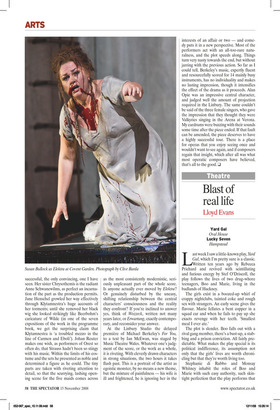Thrills amid the gore
Michael Tanner
Elektra Royal Opera House For You Linbury Studio
The revival at the Royal Opera of Strauss’s Elektra in the production by Charles Edwards, who is also responsible for the sets and lighting, is so drastically modified from 2003 as to amount to a fresh start on the piece. It is still modernised, set in a 20th-century no man’s city, with a crumbling classical wall and a dislocated revolving door, the latter perhaps suggestive of a Viennese coffee house. Given Strauss’s sophisticated primitivism combined with snatches of schmaltzy waltzes and other pre-echoes of Der Rosenkavalier, there may be some justification for uprooting the drama from its moorings in time and place, but the result is confusing. There does come a point, now very familiar to frequenters of Ring productions, when ‘postmodern’ stagings in which characters from myth are domesticated and blatant discrepancies between text and action are indulged, where we are no longer stimulated into thinking anew about established masterworks, but left merely with a jumble of impressions and a damper on serious responding and thinking. The characters are too alienated to engage or move us, and our most positive response is likely to be to the standard of the performance, rather than to the work which it is a performance of, which has disappeared under layers of directorial largesse.
That is certainly the case with this revival. Mark Elder conducted this dense score more impressively than anyone else I have heard in the theatre, and on disc only Mitropoulos has shown such a comprehensive grasp. Elder is prepared to take much of the music slower than usual, in the interests of textural clarity, while at the same time keeping the dynamic level low until the ecstatic ‘Orest!’, when he unleashes an amazing, thrilling volume of sound from an orchestra which plays better for him than for anyone else. Thrills are really what Elektra provides, however much commentators may claim for its probing of the diseased female psyche. By making us wait so long, Elder risked and won everything. His cast is strong without being great. Susan Bullock is a lovely, intelligent and committed artist, but her voice is not quite of the dimensions the title role requires. Her acting more than compensated for that, and her final lurching mad dance was the most successful, the only convincing, one I have seen. Her sister Chrysothemis is the radiant Anne Schwanewilms, as perfect an incarnation of the part as the production permits. Jane Henschel growled her way effectively through Klytamnestra’s huge accounts of her torments; until she removed her black wig she looked strikingly like Beerbohm’s caricature of Wilde (in one of the seven expositions of the work in the programme book, we get the surprising claim that Klytamnestra is ‘a troubled mezzo in the line of Carmen and Eboli’). Johan Reuter makes one wish, as performers of Orest so often do, that Strauss hadn’t been so stingy with his music. Within the limits of his costume and the sets he presented as noble and determined a figure as he could. The tiny parts are taken with riveting attention to detail, so that the scurrying, lashing opening scene for the five maids comes across as the most consistently modernistic, seriously unpleasant part of the whole score. Is anyone actually ever moved by Elektra? Or genuinely disturbed by the uneasy, shifting relationship between the central characters’ consciousness and the reality they confront? If you’re inclined to answer yes, think of Wozzeck, written not many years later, or Erwartung, exactly contemporary, and reconsider your answer.
At the Linbury Studio the delayed première of Michael Berkeley’s For You, to a text by Ian McEwan, was staged by Music Theatre Wales. Whatever one’s judgment of the score, or the work as a whole, it is riveting. With cleverly drawn characters in strong situations, the two hours it takes flash past. This is a portrait of the artist as egoistic monster, by no means a new theme, but the mixture of painfulness — his wife is ill and frightened, he is ignoring her in the interests of an affair or two — and comedy puts it in a new perspective. Most of the performers act with an all-too-rare naturalness, and the plot speeds along. Things turn very nasty towards the end, but without jarring with the previous action. So far as I could tell, Berkeley’s music, expertly fluent and resourcefully scored for 14 mainly busy instruments, has no individuality and makes no lasting impression, though it intensifies the effect of the drama as it proceeds. Alan Opie was an impressive central character, and judged well the amount of projection required in the Linbury. The same couldn’t be said of the three female singers, who gave the impression that they thought they were Valkyries singing in the Arena at Verona. My eardrums were buzzing with their sounds some time after the piece ended. If that fault can be amended, the piece deserves to have a highly successful tour. There is a place for operas that you enjoy seeing once and wouldn’t want to see again, and if composers regain that insight, which after all was what most operatic composers have believed, that’s all to the good. ❑



















































































 Previous page
Previous page